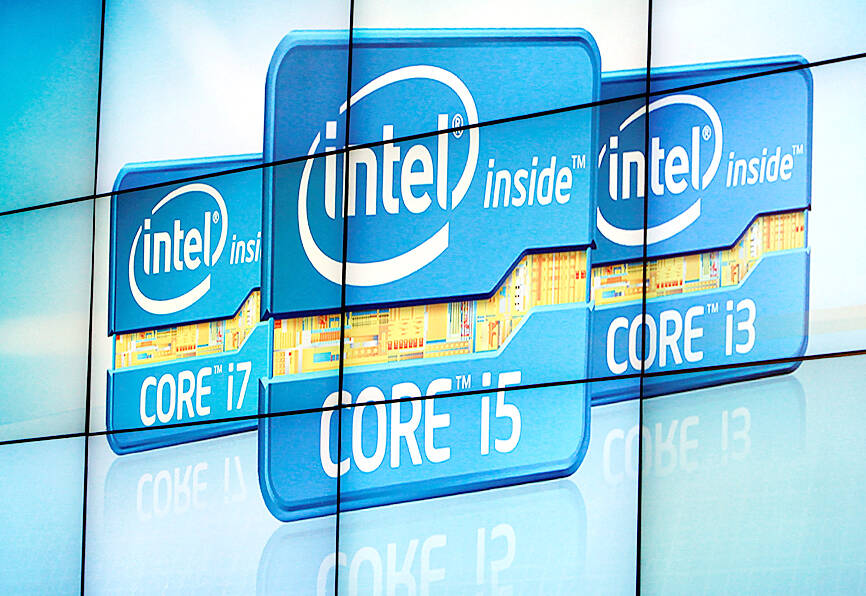Incoming Intel Corp chief executive officer Lip-Bu Tan (陳立武), who was named to the position last week, would receive compensation valued at about US$69 million if he reaches targets over the coming years.
The package includes a salary of US$1 million, plus a 200 percent performance-based bonus, the chipmaker said in a filing on Friday.
The package also includes US$66 million in long-term equity awards, stock options and new-hire incentives.

Photo: Reuters
Separately, Tan agreed to buy US$25 million in Intel shares in the first 30 days of taking the job.
“Lip-Bu’s purchase reflects his belief in Intel and commitment to creating shareholder value,” the company said in a statement.
On Wednesday last week, Intel announced Tan was filling the role left vacant when the board ousted his predecessor, Pat Gelsinger. The semiconductor industry veteran, who previously served as an Intel board member, is tasked with trying to return the company to the forefront of an industry that it dominated for decades.
Tan, 65, would assume the role tomorrow, the company said.
He would rejoin the board as well after stepping down in August last year.
Intel’s stock has rallied this year, gaining 20 percent, including a surge of 15 percent on Thursday following the announcement of Tan’s appointment.
Tan, a Malaysian-born executive, grew up in Singapore, where he attended Nanyang University and studied physics. He later went to the Massachusetts Institute of Technology, gaining a masters in nuclear engineering. He gave up his studies for a doctorate in that field and left for the University of San Francisco, where he got an MBA.
After working in venture investing, he joined the board of Cadence Design Systems Inc in 2004. He became coCEO in 2008 after incumbent Michael Fister left and then took sole possession of that role in 2009. Tan ran the company for more than a decade before moving to the position of chairman, which he occupied until 2023.
“During his time as CEO, Cadence more than doubled its revenue, expanded operating margins and delivered a stock price appreciation of more than 3,200 percent,” Intel chairman Frank Yeary said in a separate statement. “He also knows Intel well, both as a partner when he ran Cadence and having recently served on our board.”
If Tan cannot orchestrate a similar turnaround at Intel, “it was probably unfixable,” Bernstein Research senior analyst Stacy Rasgon said.

Sweeping policy changes under US Secretary of Health and Human Services Robert F. Kennedy Jr are having a chilling effect on vaccine makers as anti-vaccine rhetoric has turned into concrete changes in inoculation schedules and recommendations, investors and executives said. The administration of US President Donald Trump has in the past year upended vaccine recommendations, with the country last month ending its longstanding guidance that all children receive inoculations against flu, hepatitis A and other diseases. The unprecedented changes have led to diminished vaccine usage, hurt the investment case for some biotechs, and created a drag that would likely dent revenues and

Global semiconductor stocks advanced yesterday, as comments by Nvidia Corp chief executive officer Jensen Huang (黃仁勳) at Davos, Switzerland, helped reinforce investor enthusiasm for artificial intelligence (AI). Samsung Electronics Co gained as much as 5 percent to an all-time high, helping drive South Korea’s benchmark KOSPI above 5,000 for the first time. That came after the Philadelphia Semiconductor Index rose more than 3 percent to a fresh record on Wednesday, with a boost from Nvidia. The gains came amid broad risk-on trade after US President Donald Trump withdrew his threat of tariffs on some European nations over backing for Greenland. Huang further

CULPRITS: Factors that affected the slip included falling global crude oil prices, wait-and-see consumer attitudes due to US tariffs and a different Lunar New Year holiday schedule Taiwan’s retail sales ended a nine-year growth streak last year, slipping 0.2 percent from a year earlier as uncertainty over US tariff policies affected demand for durable goods, data released on Friday by the Ministry of Economic Affairs showed. Last year’s retail sales totaled NT$4.84 trillion (US$153.27 billion), down about NT$9.5 billion, or 0.2 percent, from 2024. Despite the decline, the figure was still the second-highest annual sales total on record. Ministry statistics department deputy head Chen Yu-fang (陳玉芳) said sales of cars, motorcycles and related products, which accounted for 17.4 percent of total retail rales last year, fell NT$68.1 billion, or

Macronix International Co (旺宏), the world’s biggest NOR flash memory supplier, yesterday said it would spend NT$22 billion (US$699.1 million) on capacity expansion this year to increase its production of mid-to-low-density memory chips as the world’s major memorychip suppliers are phasing out the market. The company said its planned capital expenditures are about 11 times higher than the NT$1.8 billion it spent on new facilities and equipment last year. A majority of this year’s outlay would be allocated to step up capacity of multi-level cell (MLC) NAND flash memory chips, which are used in embedded multimedia cards (eMMC), a managed